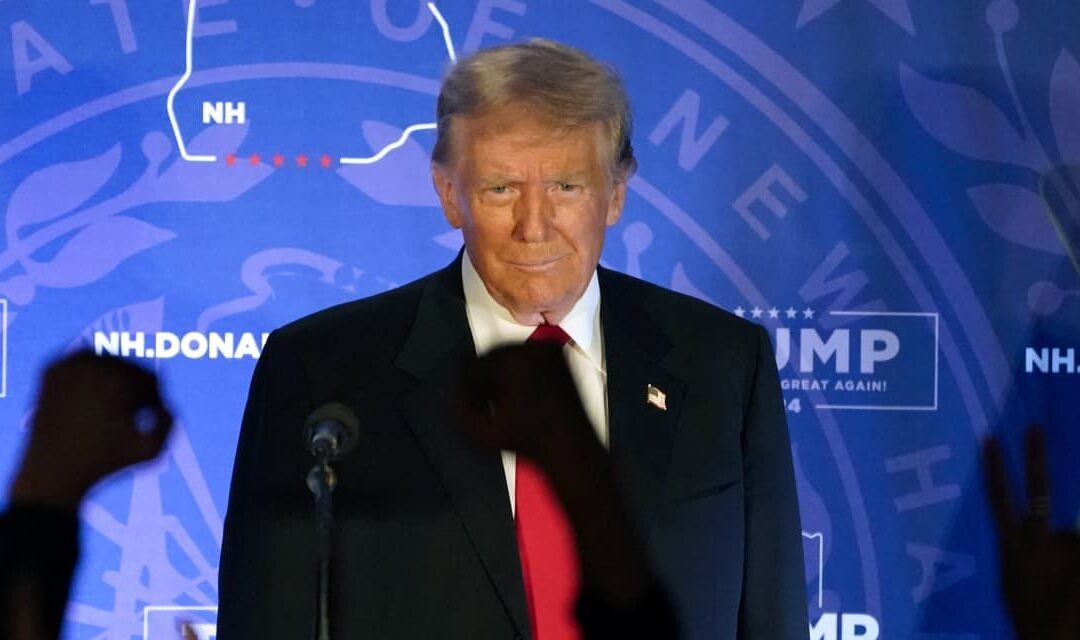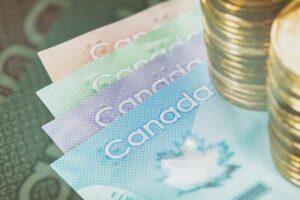With the Nov. 5 U.S. presidential election still more than nine months away, Wall Street is weighing in on the possibility that Donald Trump returns to the White House and is mapping out the potential reactions that could unfold in financial markets.
As Trump faced off with challenger Nikki Haley in the New Hampshire Republican primary on Tuesday, Dominic Wilson and Vickie Chang of Goldman Sachs
GS,
looked back to the market reaction seen from the results of last week’s Iowa Caucus. In particular, they zeroed in on a 13-hour window after the caucus took place at 7 p.m. local time on Jan. 15, and point out that the dollar strengthened against its major peers by enough “to look unusual relative to normal levels of volatility.”
The greenback’s pronounced moves during that window suggest that Trump’s likely focus on trade and international policies “could provide a meaningful further boost to the dollar,” Wilson, a senior advisor in Goldman Sach’s global markets research group, and Chang, a strategist, wrote in a note late Monday. Treasury yields also moved higher, helping to support their view that a Trump-led Republican sweep could affect the government-debt market as well.
How equities, currencies, and Treasury yields moved during a 13-hour window after the Iowa Caucus started.
Source: Bloomberg, Goldman Sachs Global Investment Research
Read: Stock-market investors face an ugly election season. Can bulls take comfort in history? and Trump tax cut 2.0: Would slashing the corporate rate again boost stocks?
Goldman Sachs isn’t alone in considering a Trump victory in November. On Monday, Gennadiy Goldberg, head of U.S. rates strategy at TD Securities in New York, reiterated his firm’s view that the election will likely be a rematch between Trump and President Joe Biden.
TD’s baseline scenario is that Trump wins and that Republicans recapture the Senate, “though control of the House may go to the Democrats by a tight margin,” Goldberg wrote in a note. “While improving economic conditions would historically suggest solid odds for President Biden’s re-election, non-economic factors and the lingering specter of still-high inflation could play in Trump’s favor.”
In Goldberg’s view, “markets are likely to focus on tax/growth, deficit, regulation, geopolitical, and tariff implications in their reaction to the election.” A Trump victory and split Congressional control should push the 10-year term premium higher and “may boost equities amid expectations that corporate taxes remain low.”
Last week, Jamie Dimon, chief executive of JPMorgan Chase & Co.
JPM,
spoke about Trump from the World Economic Forum in Davos, Switzerland. He urged people to consider why supporters of the Make America Great Again movement are choosing Trump, adding that the former president “grew the economy quite well” and “wasn’t wrong” about critical issues that voters care about.
Investors have been seen as flocking to a so-called “Trump Trade” this week, helping to give the Russell 2000 index of small companies
RUT
a lift on Monday.
As of Tuesday morning, Treasury yields were little changed to higher ahead of this week’s preliminary fourth-quarter U.S. GDP reading and PCE inflation data for December, while U.S. stocks
DJIA
SPX
COMP
turned lower.









